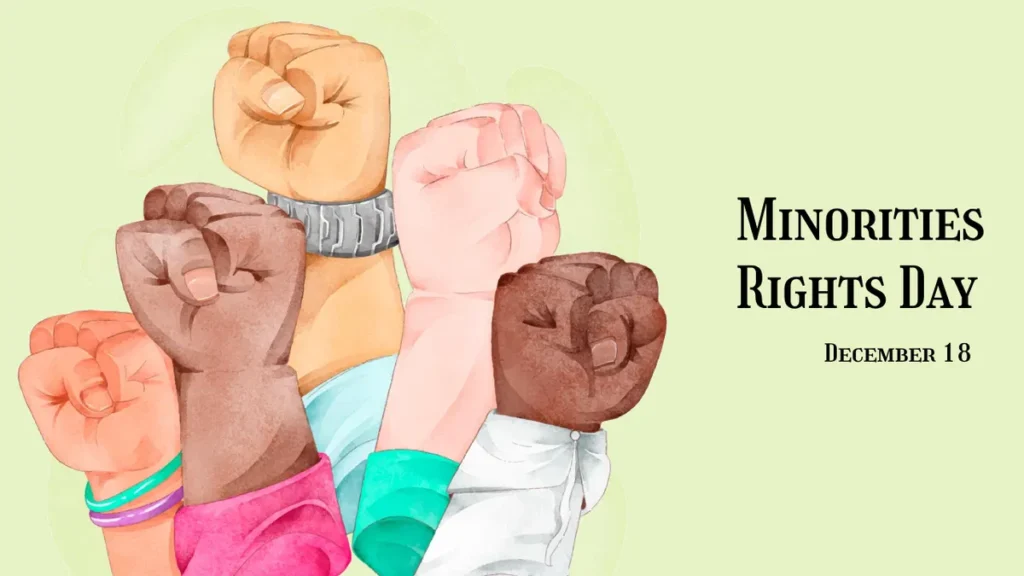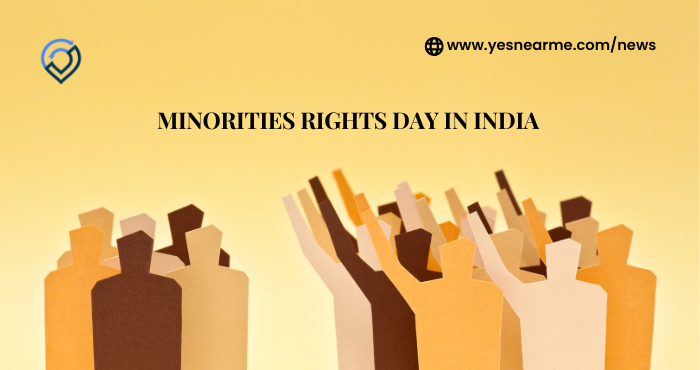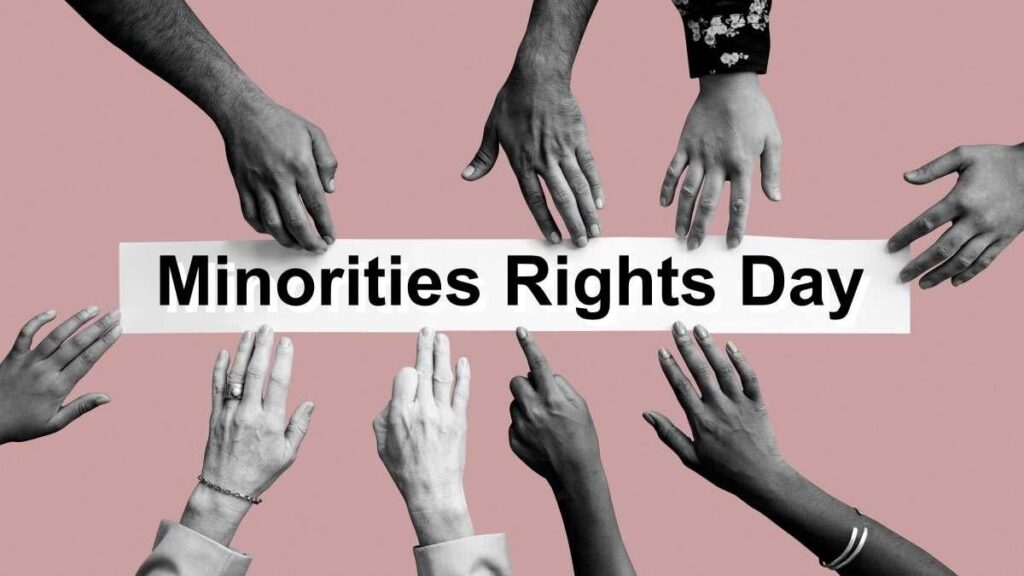Minorities Rights Day in India: A Comprehensive Overview
Introduction

Minorities Rights Day in India is observed every year on December 18 to promote the rights, protection, and welfare of religious, linguistic, and ethnic minorities in the country. This day serves as a reminder of the constitutional and legal safeguards provided to minorities and aims to foster social harmony, equality, and inclusiveness. Recognizing the importance of minority rights ensures that every community can coexist peacefully and contribute to the nation’s development.
The day holds special significance as it aligns with the principles of democracy, secularism, and human rights that form the foundation of India’s diverse society. By acknowledging and addressing the challenges faced by minority groups, the government and civil society work toward creating an equitable environment where every citizen has the freedom to practice their religion, language, and culture without discrimination.
In a country as diverse as India, where multiple religious and linguistic communities coexist, safeguarding minority rights is fundamental to maintaining national unity. The observance of Minorities Rights Day serves as an opportunity to reflect on the progress made in protecting these rights and to identify areas where further efforts are required. It is a day that calls upon policymakers, activists, and citizens to reaffirm their commitment to social justice, non-discrimination, and empowerment of marginalized communities. By raising awareness about the importance of minority rights, the day highlights the need for inclusive development and equitable opportunities for all, ensuring that no community is left behind.
Historical Background of Minorities Rights Day
The observance of Minorities Rights Day stems from the global commitment to protect the rights of national, ethnic, religious, and linguistic minorities. The United Nations General Assembly (UNGA) played a pivotal role in laying the foundation for this initiative by adopting the Declaration on the Rights of Persons Belonging to National or Ethnic, Religious, and Linguistic Minorities on December 18, 1992.
This declaration aimed to establish an international framework that emphasized:
- Protection of minority rights as a fundamental aspect of human rights.
- Promotion of peace, democracy, and development by ensuring equal rights for all communities.
- Preserving cultural, linguistic, and religious identities of minorities worldwide.
India’s Adoption of Minorities Rights Day
Inspired by this global effort, India officially designated December 18 as Minorities Rights Day to reaffirm its commitment to upholding the rights of its diverse minority communities. The decision to observe this day was driven by India’s long-standing constitutional and legal framework designed to protect and empower minorities.
India, being home to a multicultural and multi-religious society, recognizes the importance of ensuring equal opportunities and protection against discrimination for minority groups, including:
- Religious minorities such as Muslims, Christians, Sikhs, Buddhists, Jains, and Parsis.
- Linguistic minorities who speak regional or lesser-known languages.
- Ethnic minorities with distinct cultural traditions.
Legal and Constitutional Framework for Minority Rights in India
The Indian Constitution guarantees several provisions to safeguard the rights of minorities, including:
- Article 29 & 30 – Protection of cultural and educational rights of minorities.
- Article 15 & 16 – Prohibition of discrimination and provision for equal opportunities.
- Article 25-28 – Freedom of religion and protection of religious practices.
- National Commission for Minorities Act, 1992 – Established to monitor and safeguard minority rights.
Through Minorities Rights Day, India not only reinforces its commitment to these constitutional safeguards but also spreads awareness about the significance of diversity, inclusivity, and social harmony.

Understanding Minorities in India
India is a secular nation that upholds the principles of unity in diversity. The country is home to various religious, linguistic, and cultural minorities. As per the National Commission for Minorities (NCM), the following religious communities are officially recognized as minorities in India:
- Muslims
- Christians
- Sikhs
- Buddhists
- Jains
- Zoroastrians (Parsis)
Additionally, linguistic minorities—groups whose mother tongue is different from the official language of the state in which they reside—are also considered under the broader framework of minority rights.
Constitutional and Legal Safeguards for Minorities in India
The Indian Constitution provides several safeguards to protect the rights and interests of minority communities. Some of the key constitutional provisions include:
1. Fundamental Rights (Part III of the Constitution)
- Article 14 – Ensures equality before the law and equal protection of the laws.
- Article 15 – Prohibits discrimination based on religion, race, caste, sex, or place of birth.
- Article 16 – Ensures equal opportunities in matters of public employment and prevents discrimination.
- Article 19 – Grants the freedom of speech, expression, and association, allowing minorities to preserve their cultural identity.
- Article 25-28 – Provides religious freedom, including the right to practice, profess, and propagate any religion.
2. Special Provisions for Minorities
- Article 29 – Protects the rights of citizens to conserve their distinct language, script, and culture.
- Article 30 – Grants minorities the right to establish and administer educational institutions of their choice.
Role of National Commission for Minorities (NCM)
The National Commission for Minorities (NCM) was established under the National Commission for Minorities Act, 1992, with the primary objective of safeguarding the rights and interests of minority communities in India. As an independent statutory body, the NCM plays a crucial role in ensuring the protection and promotion of minority rights through various functions and responsibilities.
Key roles and responsibilities of the NCM include:
- Examining and monitoring policy implementation – The commission oversees and assesses the implementation of constitutional safeguards, government schemes, and policies aimed at the welfare of minorities. It ensures that these measures are effectively enforced at both central and state levels.
- Investigating complaints regarding deprivation of rights – The NCM has the authority to investigate cases where minorities face discrimination, injustice, or deprivation of their fundamental rights. It takes appropriate action to address grievances and recommends necessary measures for redressal.
- Promoting awareness about minority rights – The commission actively engages in educational campaigns, seminars, and awareness programs to inform minority communities about their rights, legal protections, and available government schemes.
- Advising the government on policy formulation – The NCM provides recommendations to the central and state governments on issues related to minority welfare, religious harmony, and socio-economic development. It plays a key role in shaping policies that ensure the equitable growth of all communities.
- Conducting research and studies – The commission undertakes studies and research on the conditions of minority communities to identify challenges and suggest reforms for their betterment.
- Interacting with international organizations – The NCM collaborates with global human rights bodies and minority commissions in other countries to exchange knowledge and best practices for minority welfare and protection.
By performing these functions, the National Commission for Minorities serves as a vital institution in promoting inclusivity, protecting minority rights, and ensuring social harmony in a diverse country like India.
Challenges Faced in Protecting Minority Rights in India
Despite constitutional safeguards and various legal provisions aimed at protecting the rights of diverse communities, several challenges persist, affecting their socio-economic, political, and cultural well-being. These challenges often lead to disparities in development, access to resources, and representation in various sectors.
1. Socio-Economic Disparities
One of the most pressing concerns faced by underprivileged groups in India is economic and educational backwardness. Many marginalized communities, particularly Muslims, Scheduled Caste Christians, and other socially disadvantaged groups, encounter:
- Lower literacy rates compared to the national average, which limits employment prospects.
- Limited access to quality education, as fewer educational institutions cater to their needs.
- High poverty rates and financial exclusion, making it difficult to access credit, loans, and entrepreneurship opportunities.
- Healthcare disparities, leading to inadequate medical facilities, higher infant mortality rates, and lower life expectancy.
Although government schemes exist to bridge these gaps, slow execution and lack of awareness about these programs often prevent effective change.
2. Discrimination and Social Barriers
Despite legal safeguards, bias and exclusion continue to affect several communities across different aspects of life. Major challenges include:
- Communal tensions and religious intolerance, creating insecurity and fear.
- Discrimination in employment and housing, where individuals face prejudices in job opportunities and rental agreements.
- Stereotyping and misconceptions, leading to reduced social mobility and limited professional growth.
- Incidents of mob violence and hate crimes, further deepening societal divisions and disrupting communal harmony.
Such barriers hinder integration, making it difficult for individuals to participate fully in social and economic progress.
3. Political Underrepresentation
Despite forming a significant portion of India’s population, these groups remain underrepresented in governance and policymaking, which affects their ability to advocate for their interests. Key concerns include:
- Limited representation in legislative bodies, including Parliament and State Assemblies.
- Underrepresentation in government and administrative roles, despite affirmative action policies for certain groups.
- Lack of strong political leadership, resulting in policies that may not fully address community-specific issues.
The absence of inclusive decision-making often leads to policy neglect, widening the socio-economic divide further.
4. Preservation of Cultural Identity
Linguistic and cultural groups struggle to maintain their unique heritage due to the widespread dominance of major languages and traditions. Some of the key challenges they face include:
- Declining use of regional and indigenous languages, particularly among younger generations.
- Threats to traditional customs and practices, as rapid globalization influences cultural preferences.
- Lack of support for independent media and literature, limiting opportunities to share cultural perspectives.
- Difficulties in maintaining religious sites and institutions, with some facing financial and legal challenges.
Safeguarding linguistic and cultural diversity is essential to maintaining India’s rich pluralistic heritage. However, without active policy measures and community-driven initiatives, many traditions risk fading over time.
The Need for Inclusive Policies
To address these challenges, a multi-pronged approach is necessary, ensuring equal opportunities for all citizens. Some key steps include:
✅ Strengthening the implementation of educational and economic programs for social upliftment.
✅ Enforcing anti-discrimination laws effectively to curb biases in employment, housing, and other sectors.
✅ Enhancing political participation and representation at all levels of governance.
✅ Supporting cultural preservation initiatives, including language promotion and representation in media.
By fostering inclusivity and equitable development, India can reinforce its democratic values and social cohesion, ensuring that all communities have the same rights, dignity, and opportunities to thrive.
Government Initiatives for Minority Welfare
To address these challenges, the Indian government has implemented various schemes and policies:
1. Prime Minister’s 15-Point Programme for the Welfare of Minorities
This program focuses on enhancing education, employment, and economic empowerment among minority communities through scholarships, skill development, and financial support.
2. Nai Manzil Scheme
Aims to provide educational and skill development opportunities for school dropouts from minority communities.
3. Padho Pardesh Scheme
Offers interest subsidies on educational loans for minority students pursuing studies abroad.
4. USTAAD (Upgrading the Skills and Training in Traditional Arts/Crafts for Development)
Promotes traditional arts and crafts among minority artisans to preserve cultural heritage and enhance economic opportunities.
Significance of Minorities Rights Day
Observing Minorities Rights Day is crucial for fostering social harmony, protecting diversity, and ensuring that every individual, irrespective of their religious, cultural, or linguistic background, enjoys equal opportunities and rights. The day serves as a powerful reminder of the need to uphold the values of equality, justice, and inclusivity in a multicultural society like India.
Key objectives and significance of Minorities Rights Day include:
- Raising awareness about minority rights and government initiatives – The day highlights the legal safeguards, policies, and welfare programs designed to empower minority communities. Various awareness campaigns, seminars, and discussions are conducted to educate people about their rights and available support mechanisms.
- Encouraging dialogue between communities to promote inclusivity – Minorities Rights Day fosters interfaith and intercultural discussions, bridging gaps between different communities. It provides an opportunity to address misconceptions, strengthen social cohesion, and promote a sense of belonging for all citizens.
- Addressing socio-economic challenges faced by minorities – The observance of this day draws attention to the issues of discrimination, economic disparity, and limited access to education and employment that minorities often face. It encourages policymakers to take corrective actions and implement measures that enhance the overall development of marginalized communities.
- Strengthening human rights and democratic values – The day reinforces the commitment to human rights, ensuring that minority communities receive protection from any form of oppression or discrimination. It aligns with global principles of democracy and equality, advocating for a fair and just society.
- Recognizing contributions of minority communities – Minorities Rights Day also celebrates the cultural, social, and economic contributions of minority communities in nation-building. It acknowledges their role in enriching the heritage and progress of the country.
By observing Minorities Rights Day, governments, civil societies, and individuals reaffirm their commitment to a more inclusive and equitable society where every community can thrive with dignity and respect.
MINORITIES RIGHTS DAY IN INDIA QUOTES IN ENGLISH
-
“Equality and justice are the rights of every citizen; minorities are the strength of our society.”
-
“True democracy is where everyone, regardless of religion, language, or caste, enjoys equal rights.”
-
“Respecting and protecting minorities is the hallmark of a progressive society.”
-
“Real strength lies in diversity; every community’s contribution is invaluable.”
-
“Without equality, democracy remains incomplete.”
-
“Protecting minority rights is one of humanity’s greatest responsibilities.”
-
“A nation thrives on justice and equality, not discrimination.”
-
“Freedom is truly meaningful when every individual enjoys equal opportunities and rights.”
-
“Our diversity is our strength; we must cherish and safeguard it.”
-
“The Constitution grants equal rights to all; it is our duty to uphold them.”
MINORITIES RIGHTS DAY IN INDIA QUOTES IN HINDI
-
“समानता और न्याय हर नागरिक का अधिकार है, अल्पसंख्यक भी हमारे समाज की ताकत हैं।”
-
“धर्म, भाषा, जाति से ऊपर उठकर, सबको समान अधिकार मिले, यही असली लोकतंत्र है।”
-
“अल्पसंख्यकों का सम्मान और सुरक्षा एक प्रगतिशील समाज की पहचान है।”
-
“असली ताकत विविधता में है, हर समुदाय का योगदान अनमोल है।”
-
“जहाँ समानता नहीं, वहाँ लोकतंत्र अधूरा है।”
-
“अल्पसंख्यकों के अधिकारों की रक्षा करना मानवता की सबसे बड़ी जिम्मेदारी है।”
-
“न्याय और समानता से ही राष्ट्र सशक्त बनता है, भेदभाव से नहीं।”
-
“हर व्यक्ति को समान अवसर और अधिकार मिलें, तभी सच्ची आज़ादी का अर्थ पूर्ण होगा।”
-
“हमारी विविधता हमारी शक्ति है, हमें इसे बचाकर रखना है।”
-
“संविधान ने सभी को समान अधिकार दिए हैं, इन्हें बनाए रखना हम सबकी जिम्मेदारी है।”
Conclusion
Minorities Rights Day in India is more than just an annual observance; it is a reaffirmation of the country’s commitment to secularism, democracy, and human rights. It serves as a reminder that protecting and promoting the rights of minority communities is not just a legal obligation but also a moral imperative for building a just, inclusive, and progressive society.
Ensuring equal opportunities, addressing socio-economic challenges, and safeguarding cultural and religious identities are essential steps toward national integration and social harmony. By recognizing the contributions of minorities and addressing their concerns, India continues to uphold the values of equality, diversity, and mutual respect that form the foundation of its rich heritage.
As we observe this important day, it is imperative for all stakeholders—government institutions, policymakers, civil society organizations, and citizens—to work collectively toward fostering an environment where every individual, regardless of their background, can thrive and contribute to the nation’s development. True progress lies in embracing diversity and ensuring that no community is left behind in the journey toward a more equitable and harmonious society.
Minorities Rights Day is a call to action, urging everyone to stand against discrimination, advocate for inclusivity, and strengthen the democratic principles that make India a truly diverse and united nation.
For More Info You Can Visit Here .
Want to read more articles like this? Explore now!








Recent Comments